Lars Von Trier: An Overview
Written by: FFT Webmaster | October 4th, 2011
Sandy Mandelberger, FFT’s Editor-In-Chief, posted a story on provocative filmmaker Lars Von Trier called “Lars Von Trier Takes Back His Nazi Apology” on September 30.
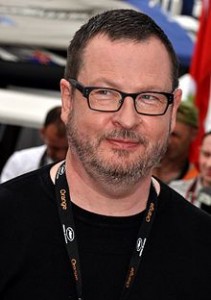 I’ve been a huge fan of von Trier since Breaking the Waves (1996). Raised a strict Catholic by Dominican nuns, I understood the movie and, through my obsession with female saints and mystics, know the power of sacrifice. Breaking the Waves won the Grand Prix at Cannes. The film featured Emily Watson, who was nominated for the Academy Award for Best Actress.
I’ve been a huge fan of von Trier since Breaking the Waves (1996). Raised a strict Catholic by Dominican nuns, I understood the movie and, through my obsession with female saints and mystics, know the power of sacrifice. Breaking the Waves won the Grand Prix at Cannes. The film featured Emily Watson, who was nominated for the Academy Award for Best Actress.
I loved Dancer in the Dark (2000) starring Björk and Catherine Deneuve and Antichrist (2009) starring Willem Dafoe and Charlotte Gainsbourg. I hated Dogville (2003) starring Nicole Kidman.
Culled from interviews found online and my saved articles on von Trier, there is a lot to cover on the now infamous filmmaker.
I cannot believe that von Trier’s comments, given at a 2011 Cannes Film Festival press conference, were made out of boredom. No one jokes about liking, understanding, or wanting to be a Nazi.
One place you would be restricted from naming your child “Adolf Hitler” is Germany, which has stringent guidelines on which names are permissible. The name “Adolf” has been pretty much verboten in Germany since World War II.
Our pope, Pope Benedict XVI, is German!
What exactly did von Trier say at the press conference for his new film Melancholia that had him banned from the Cannes Film Festival? Von Trier said:
“The only thing I can tell you is that I thought I was a Jew for a long time and was very happy being a Jew, then later on came [Danish and Jewish director] Susanne Bier, and suddenly I wasn’t so happy about being a Jew. That was a joke. Sorry. But it turned out that I was not a Jew. If I’d been a Jew, then I would be a second-wave Jew, a kind of a new-wave Jew, but anyway, “I really wanted to be a Jew and then I found out that I was really a Nazi. Because my family was German… which also gave me some pleasure. So I’m kind of a… What can I say? I understand Hitler. But I think he did some wrong things, yes absolutely, but I can see him sitting in his bunker. But there will come a point, at the end of this… I’m just saying, I think I understand the man. He’s not what you would call a good guy, but yeah, I understand much about him and I sympathize with him a little bit. But come on, I’m not for the Second World War, and I’m not against Jews… I am of course, very much for Jews. No, not too much, because Israel is a pain in the ass. But still, how can I get out of this sentence? No, I just want to say about the art, I’m very much for Speer. Albert Speer, I liked. He was also maybe one of God’s best children. He had some talent that was kind of possible for him to use… okay, I’m a Nazi.”
Continuing his shocking comments, von Trier speculated that his next movie could be The Final Solution. The Hollywood Reporter’s story on the uproar contained this: “Von Trier has never been very P.C. and his Cannes press conferences always play like a dark stand-up routine, but at the Melancholia press conference he took it to another level, tossing a grenade into any sense of public decorum. In response to a question about his Germanic roots, Von Trier set off on a long and twisted answer that, if this were America, not Cannes, would have meant career suicide.”
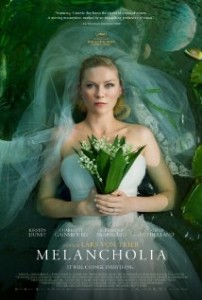 Regardless of the controversy, Kirsten Dunst won the Best Actress prize at the Cannes Film Festival for Melancholia.
Regardless of the controversy, Kirsten Dunst won the Best Actress prize at the Cannes Film Festival for Melancholia.
The Festival de Cannes reacted by issuing a statement declaring von Trier “persona non grata” effective immediately. Von Trier told an interviewer he was “very happy” to be “persona non grata” at Cannes.
Von Trier’s controversial and inappropriate comments will certainly challenge finding a U.S. distributor and an audience for Melancholia (2011) starring along with Dunst, Antichrist’s Charlotte Gainsbourg.
Von Trier was raised by nudist Jewish Communist parents who did not allow much room in their household for “feelings, religion, or enjoyment,” as von Trier said. The young Lars went on several childhood holidays to nudist camps. His parents regarded the disciplining of children as reactionary. Trier has noted that he was brought up in an atheist family, and that although his father was Jewish, he was not religious.
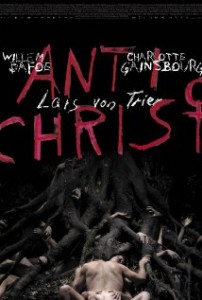 Von Trier’s mother, a civil service worker named Inger Høst, confessed that his real father was not Ulf Trier but rather her employer, Fritz Michael Hartmann; she explained she wanted a man with “artistic genes,” and Hartmann, a member of an illustrious family of Danish composers, seemed to fit the bill.
Von Trier’s mother, a civil service worker named Inger Høst, confessed that his real father was not Ulf Trier but rather her employer, Fritz Michael Hartmann; she explained she wanted a man with “artistic genes,” and Hartmann, a member of an illustrious family of Danish composers, seemed to fit the bill.
When von Trier went to meet Hartmann, they didn’t hit it off, with Hartmann eventually telling von Trier “that if there was more to be communicated, it could be through his lawyer.” Hartmann was German, although not a Nazi. The revelations led von Trier to attempt to “erase” the connections with his stepfather by converting to Catholicism, and to rework his filmmaking into a style emphasizing “honesty”.
Von Trier said: “I don’t know if I’m all that Catholic really. I’m probably not. Denmark is a very Protestant country. Perhaps I only turned Catholic to piss off a few of my countrymen.” He has a habit of “pissing off” his countrymen. In 1997, he was made a Knight of the Order of the Dannebrog. Ten years later von Trier decided to bring back the prize, saying that the Danish royal family are just “simple people of bad quality”.
Von Trier has had a combative relationship with his female stars.
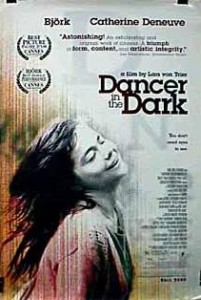 At the 2000 Cannes Film Festival, Dancer in the Dark won the Palme d’Or and Björk won the Best Actress award. However the accolades, there was much friction on the film set. Björk refused to come to the set for four days.
At the 2000 Cannes Film Festival, Dancer in the Dark won the Palme d’Or and Björk won the Best Actress award. However the accolades, there was much friction on the film set. Björk refused to come to the set for four days.
In an interview, von Trier spoke of his conflict with Björk during filming. He said:
“Seriously, it’s true that I pushed Björk a lot, maybe too far, but I was also very happy with her performance. She gave everything she had. As a director you do what you can to get the performance you want, that’s your job, and sometimes you have tap into people’s past experiences and memories to bring that out. I usually have very good relationships with my actresses, but Björk and I didn’t get along.”
When told that it was widely reported that Björk said she’ll never act again, von Trier said: Yeah, and that’s not all, she even wrote Nicole Kidman a letter telling her not to do Dogville.
The interview asked “Really? What did she say?” von Trier replied: “She said I had destroyed her soul.”
In an interview, pop star Björk labeled von Trier a woman-hating “soul robber”. When asked about working with von Trier, she said: “Lars doesn’t consider it his responsibility to make sure people are psychologically stable after he’s worked with them in such an intense way. As far as he’s concerned, they can be ruined emotionally, but that’s just not his responsibility. Also, I wasn’t comfortable with the way he worked with his group. My father was a union leader, and very working class, so I definitely didn’t agree with the kind of hierarchy that I witnessed in Denmark. Lars has a team of people he’s worked with since he was a teenager, and so do I. Of course, I left my team behind to do the film, so when I came back, it was as if I had a big mirror to see how I was communicating.”
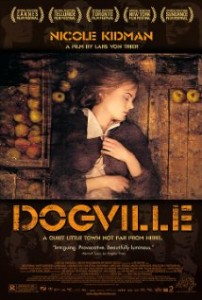 Nicole Kidman, although more restrained in her remarks concerning her unpredictable Dogville director, quickly canceled plans to continue working with von Trier after the film’s tempestuous Cannes reception-a scene featuring Kidman chained to a wheel brought forth accusations of misogyny from many of the thousands of journalists on hand for the premiere.
Nicole Kidman, although more restrained in her remarks concerning her unpredictable Dogville director, quickly canceled plans to continue working with von Trier after the film’s tempestuous Cannes reception-a scene featuring Kidman chained to a wheel brought forth accusations of misogyny from many of the thousands of journalists on hand for the premiere.
Regarding Antichrist, which has nudity, full-on genital mutilation and talking animals, Lars von Trier explained the film thusly: “I’ve entered my anal phase. Antichrist is just poop smeared all over everything. I’m no longer the quiet boy who sits in the back of the class.”
Despite being effectively banned from Cannes for life (it’s uncertain whether the persona non grata status is temporary or for all time), von Trier met with the press to discuss the fallout from the controversy.
Sensing that his remarks amounted to a public-relations disaster and an inadvertent effort to sabotage his film’s chances for the festival’s highest honor, the Palme d’Or, he voiced his regret over the brouhaha he created. “It was stupid and the wrong place to be sarcastic,” von Trier admitted. “Of course, I don’t sympathize with Hitler. And, as we all know, the Holocaust was the cruelest and most barbaric crime against humanity of the last century … My only excuse is that if I think a press conference is getting boring I start to perform.”
That was then.
As Mandelberger wrote in “Lars Von Trier Takes Back His Nazi Apology”, in an interview in the magazine GQ, he remarked that “I am not sorry for what I said. I’m sorry that it didn’t come out more clearly. I’m not sorry that I made a joke, but I’m sorry that I didn’t make it clear that it was a joke. But I can’t be sorry for what I said – it’s against my nature.” http://filmfestivaltoday.com/reel-fast/lars-von-trier-takes-back-his-nazi-apology

